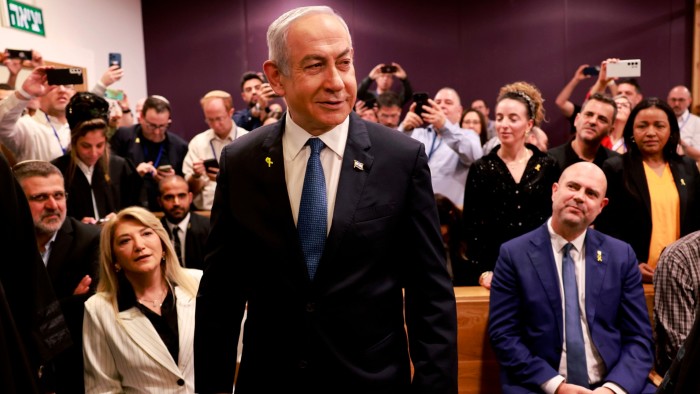Unlock the Editor’s Digest for free
Roula Khalaf, Editor of the FT, selects her favourite stories in this weekly newsletter.
A defiant Benjamin Netanyahu denounced Israel’s media and prosecutors after he finally took the stand in his long-running corruption trial, deriding the proceedings as a dangerous distraction from the country’s wars in the Middle East.
The prime minister’s appearance, the first of what could end up being weeks of questioning, took place after repeated legal wrangling by his team designed to prevent him from being called on to testify. Proceedings began in 2020 but were long delayed by Covid, legal manoeuvring and the wars in Gaza and Lebanon.
Netanyahu’s harshest domestic critics have accused him of extending the conflict against Hamas in Gaza to delay this day of reckoning, while his supporters have demanded that he be unencumbered in order to lead the war effort.
The prime minister, who was charged with bribery, fraud and breach of trust in three complex, overlapping criminal cases focused on his relationships with wealthy business people, attempted to establish in the courtroom what he has alleged for years: that a left-wing media and prosecutorial cabal was engaged in a “ruthless witch-hunt”.
Prosecutors allege that Netanyahu accepted expensive presents such as champagne and cigars from wealthy friends in return for favours, and in other instances, offered regulatory advantages to media outlets to win favourable coverage. He has denied all the charges.
The hours of testimony on Tuesday barely touched on the facts at the heart of the case, however. Instead, Netanyahu’s attorneys led him through a line of questioning in which he presented himself as the harangued leader of an embattled state, who worked 17 hours a day to keep Israelis safe while fighting off lies and libel from journalists.
“I took criticism and attacks, insults, libel and lies, in a scope that very few people, and no one in Israel has ever faced,” he said. “There has never been such a biased media in any democracy, possibly in any country on Earth, as there is in Israel.”
His meandering testimony swung between crucial world events — from the 1916 Sykes-Picot Agreement that partitioned the Middle East between western powers to Netanyahu’s 2015 break with then US president Barack Obama over Iran’s nuclear programme — and the mundane.
The prime minister discussed his work habits, the number of documents he signed a day and the rare cigar he allows himself but, he said, he never has a chance to finish.
“Sometimes I sin with a cigar that I can’t even smoke in peace because of the constant interruptions,” he said. “And by the way, I hate champagne.”
The trial has convulsed the nation’s politics, triggering multiple elections and has pitted Israel’s longest-serving premier — who began his first of several terms in 1996 — against a judicial system he has sought to tame through controversial reforms that triggered mass street protests.
Netanyahu, who has become increasingly reliant on the support of far-right political parties to stay in power, suffered a dramatic drop in popularity over his failure to prevent the October 7 2023 surprise raid by Hamas, in which the Palestinian militant group killed 1,200 people.
Israel’s subsequent offensive in Gaza has killed more than 44,000 people, according to Palestinian health officials, and Netanyahu’s domestic approval ratings have improved as the country landed devastating military blows against Hamas, Hizbollah in Lebanon, and Iran.
The testimony is set to turn more confrontational in the coming days when prosecutors are finally able to question him about the evidence they have collected in multiyear probes.
Those include allegations that Netanyahu and his wife Sara were plied with hundreds of thousands of expensive gifts, and that Netanyahu offered a trade to a newspaper publisher in which he would receive favourable coverage in exchange for helping dent a rival newspaper’s circulation.
But on the first day of the trial that could decide not just his political future, but also his personal freedom, Netanyahu unveiled a legal strategy that mirrors his political persona: that of a man who has sacrificed much for the nation, now the subject of a witch hunt that places Israel itself at risk.
During his short stints out of office, Netanyahu said: “I enjoyed trips, meals, even made a good living.” But then, he told the court, he was called back to serve Israel. “I went back to the coal mines.”
Read the full article here




